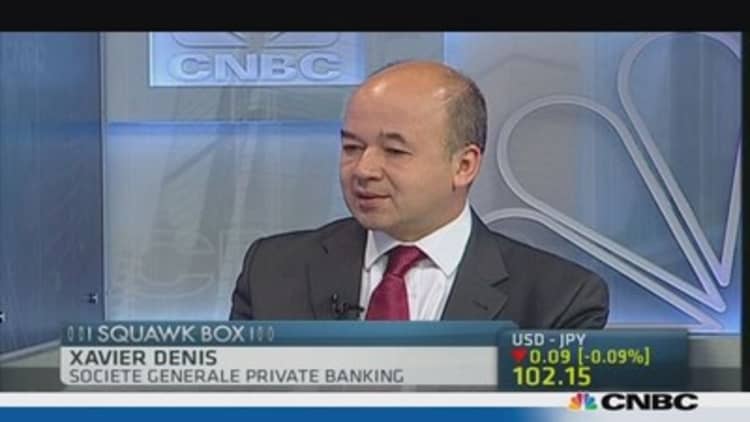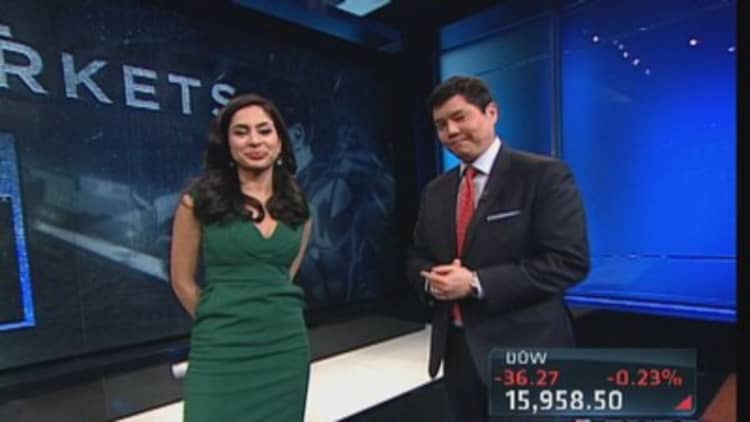Emerging market assets may have sold off to what appear to be attractive valuations, but analysts say the stars are not yet aligned for bargain hunting.
"There is no denying that EM assets are now generally cheap," Societe Generale said in a note, but it added "valuation alone is unlikely to be enough as a key market driver."
Emerging markets have seen a brutal sell-off this year after sharp falls in the value of the Argentine peso, Turkish lira, South African rand and Brazilian real triggered panic selling across the asset class, with analysts largely blaming the turbulence on the Federal Reserve's move to begin tapering its asset purchases.
While the pace of fund outflows has been slowing this month after a tough January, around $21.7 billion has flowed out of emerging market equity funds from the beginning of the year through February 12 after $15.2 billion in outflows in 2013, according to data from Barclays. Emerging market bond funds have lost $8.01 billion over the same period, compared with $14.04 billion in 2013, the data show.
(Read more: Are markets headed for a perfect storm?)
"While the panic is over, it is too early to call for a sustained rally," SocGen said. "We are going to need to see a proper trigger," it added, saying it is looking for stronger economic data after recent softness in economic growth.

Others also are looking for better indicators before calling a buying opportunity in emerging markets.
"A simple backtest of global emerging market performance from points at which they have been as oversold as they are currently suggests that, more often than not, their underperformance continues," Credit Suisse said in a note.
It is looking for four key catalysts to offer buy signals, with signs global emerging market currencies have become "clearly cheap" the most important one.
(Read more: Are EM companies the real debt worry?)
Currencies, excluding , will only become cheap when they are at an around 5-10 percent discount to their normal undervaluation against the dollar on a purchasing power parity basis – or around 5-10 percent below their current levels, it said.
On a real effective exchange rate, or REER, basis, global emerging market currencies are down around 8 percent form their mid-2011 peak, compared with a 13 percent fall in the 2008 crisis, Credit Suisse noted, adding this suggests a further 5 percent fall would be a buy signal.
The next biggest buy signal would come from a clearly cheap equity market, it said. Credit Suisse believes emerging markets are trading at parity to developed markets on a price-to-book, or P/B, basis, after adjusting for emerging markets' tendency to be overweight on sectors with low price-to-earnings and price-to-book ratios, such as financials and resources.
"They would have to trade on a 20 percent P/B discount to developed markets for valuation alone to make us go overweight," it said.
(Read more: What happens in EM stays there, mostly: Goldman)

On a price-to-earnings basis, emerging markets are trading at a 43 percent discount to developed markets, compared with their average level of 49 percent, it noted.
Signs that macro-economic fundamentals are improving significantly would also be a buy signal, Credit Suisse said, but it added currencies or equities are likely to become cheap before that happens.
It is concerned that the excess private sector leverage is as high as it was in 1998 and signs of deleveraging would help to turn the bank more positive. In addition, low unemployment is also a concern, indicating limited scope for non-inflationary growth.
The fourth signal of a buying opportunity is the one Credit Suisse views as unlikely: commodities would need to start outperforming the cycle.
(Read more: Selloff, so what? Analysts are sticking to their guns)
"Emerging markets tend to underperform when commodity prices fall," it noted, citing a tight correlation between the two.
"We continue to worry that commodities are underperforming the cycle (as proxied by global PMIs) or oil relative to ISM new orders," it said. "This makes us wary that, even if the global economy continues to recover, the emerging markets may not be the main beneficiary as they had been in the past."
—By CNBC.Com's Leslie Shaffer; Follow her on Twitter @LeslieShaffer1

